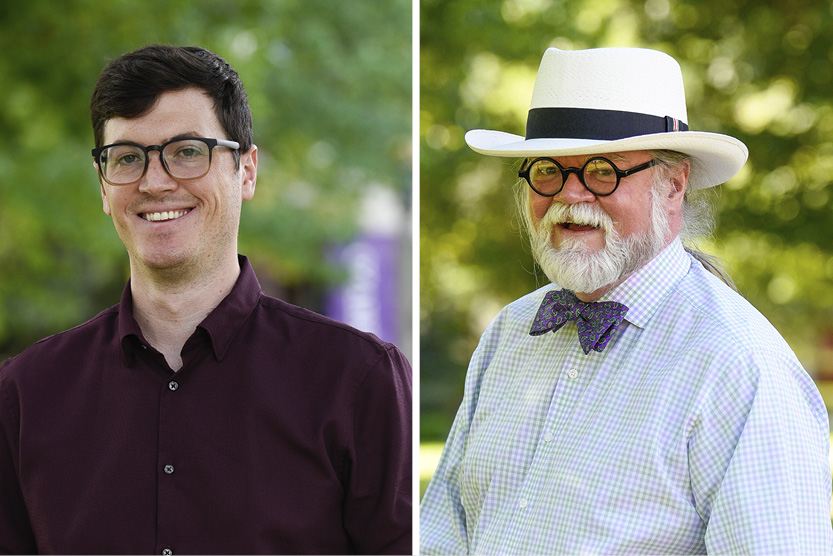
University of the Ozarks English Professors Dr. Chris Hall (left) and Dr. David Strain have each been granted an academic leave of absence for the 2023-24 academic year.
Hall, assistant professor of English, will take a leave during the Fall 2023 Semester under the University’s paid leave for tenure-track faculty policy that allows for a pre-tenure faculty members to be granted a leave at the conclusion of two years of employment. Strain, professor of English and classics, will take a semester sabbatical during the Spring 2024 Semester.
Hall, who joined Ozarks in 2021, is the first Ozarks faculty member to receive the pre-tenure academic leave since it was added to the Employee Handbook in 2018.
“This leave is an opportunity to profoundly further my own professional development and research, to improve the visibility and prestige of the University, to enhance the pedagogical benefits to our students, and to leave the English program itself in a stronger long-term situation,” Hall said. “Making it possible for faculty to take research leave early in their careers is essential so that they are able to sustain a research trajectory that will carry them through promotion and future sabbaticals as tenured professors. It is my hope that by granting this leave application, the first of its kind, a precedent will be set for future early-career faculty at Ozarks to pursue similar opportunities. Meaningful, well-funded, accessible research time is of paramount importance for supporting a healthy professoriate.”
Hall said he will use his leave to finalize his first book manuscript titled, “Biopolitics of Modernism: Race, Gender, and the Making and Remaking of the Modern World,” as well as begin work on a second book and continue “a series of other interconnected scholarly pursuits.”
“In Biopolitics of Modernism, I argue that the contemporary world is unavoidably biopolitical,” Hall said. “As familiar discourses on institutional racism, animal rights, and gendered economic disparities remind us, our political capacities are shaped by the populations we make up, the kinds of life we are. Yet the role of literature in the development of this biopolitical condition remains undertheorized. I contend, therefore, that in order to respond to the continued intersection between life and politics, we must unearth the emergence of this intersection in the moment of literary modernism and trace its development through colonialism and globalization. Biopolitics of Modernism breaks new ground in the analysis of Caribbean, African American, African, and transatlantic literature by making it possible to re-see the ways that racism and sexism have shaped twentieth-century literature and politics, and to build from these insights a political ethics that makes the world a hospitable place for life of all kinds.”
Strain, in his 30th year of teaching at Ozarks, said he will use his sabbatical to pursue “a theoretical study of the prosody of free verse and to apply what he learns to the work of a range of poets writing in free verse after 1950.”
Strain said the sabbatical project stands to benefit the college in three overlapping aspects, curricular and co-curricular, critical and creative. He referred to the University’s popular student competition, Project Poet, as an example of a creative and co-curricular endeavor that would benefit.
“Although we regard this as a co-curricular event, any connection between program and programming is accidental,” Strain said. “Granted, nobody wants to take a course in order to enter Project Poet. However, it’s entirely possible to create a series of instructional videos that would prepare students who genuinely want some preparation. I’ve done this for the metrical tradition—free verse, not so much.“
The sabbatical project could also lead to additional stand-alone courses in lyric writing as well as verse and poetry within the English program, Strain said.
“If it does nothing else, Project Poet testifies to the interest students have in creative writing,” Strain said. “Since the demise of our creative writing and philosophy minor, we have had nothing to offer them … We can satisfy our students’ demonstrable interest in lyric writing only if one of us teaches the course. I’ve done so once, in fall 2002. The experience taught me that I needed to learn a lot more about free verse if I ever teach it again. With this project, that is exactly what I propose to do.”
Upon their return, both Hall and Strain will offer a presentation regarding their work to the campus community.
Topics: About, Academics, Creative Writing / Thought, English, Faculty Spotlights
